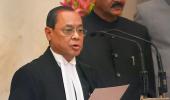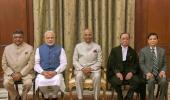Former Chief Justice of India and Rajya Sabha MP Ranjan Gogoi asked on Wednesday as to why no questions were being asked from "activist judges" and those taking commercial arbitration post retirement.

The statement assumes significance as the former CJI was criticised by several retired judges for accepting the Rajya Sabha nomination.
Responding to a question on post-retirement assignments by judges, the former CJI said there were three categories of them -- "activist judges", those taking up commercial arbitrations and the those accepting other kinds of assignments.
"Why only it is the third category that draws all the flak? Why are no questions asked about the other two?", Gogoi said.
He was speaking speaking at a webinar organised by Confederation of Alumni for National Law Universities Foundation in collaboration with a legal news portal on the topic, Ensuring an Independent Judiciary under our Constitution: Confronting the Contemporary Challenges.
Gogoi said that the judiciary is not averse to criticism but there should be an honest, intellectual and academic exercise.
"The system (judicial) is not averse to criticism and there is room for improvement... Let there be an honest, intellectual and academic exercise so far as judgments are concerned. Do not impute motives. It is destructive..,” Gogoi said.
He took exception to an “ideological group of people”, activists, intellectuals for giving “identification marks” to as to “who is an independent judge” and said that according to them a judge must be necessarily anti-establishment.
"He must be anti-authoritarianism... He must be eloquent on issues like rich-poor divide, oppression of the marginalised, issues pertaining to suppression of fundamental rights and he must advocate free speech even to the extent of touching the frontiers of defamation -- these are the identification marks of an 'independent judge'," Justice Gogoi said, adding that if a judge is not found conforming to these expectations, his independence is questioned and attacked.
"If the judge doesn't do it, 'attack the judge' -- not criticise the judgment. This is destructive of the independence of the judiciary," he said.
On the question as to why the Ayodhya judgement was bereft of the name of its author, Justice Gogoi said why must a judgment of Supreme Court have the name of its author?
"I can show 32 cases decided by a particular bench in 2015-16 when author wasn't named in the judgment. But then no questions were asked. Speaking for myself, I have myself been author of 13 judgments when author wasn't mentioned," Justice Gogoi said.
He highlighted on the need to boost the scheme for immunity to judges and said the in-house enquiry does not contemplate the participation of lawyers, witnesses, cross examination and it does not contemplate participation of outsiders.
"There are numerous complaints being made, all of which cannot be entertained. If they are serious, they are taken up. In such cases, the In house procedure/inquiry is available online," he said.
Justice Gogoi said if any complaint against a particular judge is serious enough, it is placed before the Chief Justice of India.
"You don't drive a judge through an enquiry straightway... judges won't be able to function," he said.
Justice Gogoi also expressed concern that young members of the bar were not keen to be judges.
"The office of the judge of a high court has been made so vulnerable that a lawyer is happy to continue as a lawyer. Don't forget the sacrifice a lawyer makes to become a judge," he said.
Justice Gogoi expressed satisfaction with the collegium system and said that some amount of discipline may improve it further.
"The collegium is an excellent system. It has worked well. It has stood the test of time. Some amount of discipline may make it work better. Some may not be satisfied but the idea is to be true to the law...
"The problem is with individuals running the system. The problem may not necessarily be from collegium members, but from outside the collegium but within the Judicial fraternity.," the former CJI said.











 © 2025
© 2025